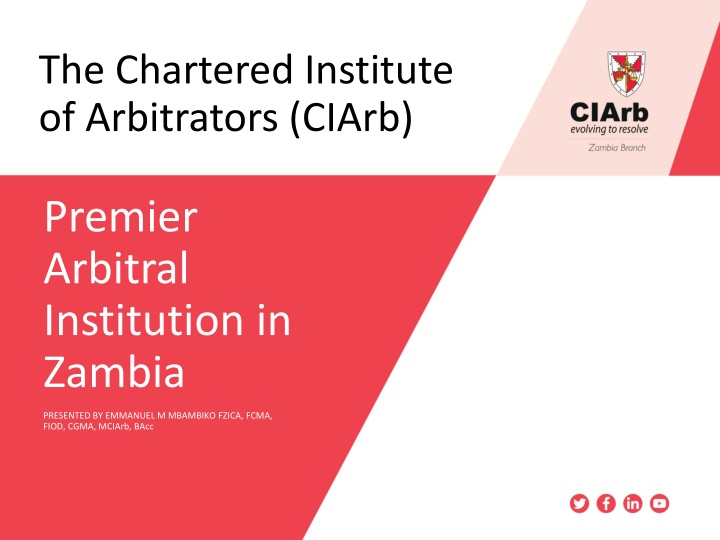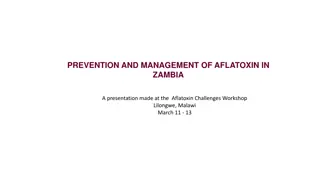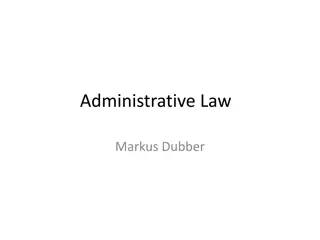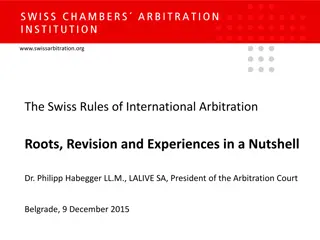The Chartered Institute of Arbitrators (CIArb) in Zambia: Premier Arbitral Institution
The Chartered Institute of Arbitrators (CIArb) is a global center of excellence for alternative dispute resolution (ADR) practices. Established in 1915 and incorporated in 1925 in the UK, it aims to elevate the status of arbitration. The Zambia branch, established in 2011, offers various services including education, training, and support for ADR practitioners, policymakers, academics, and businesses. It promotes professional and ethical standards in arbitration, mediation, and adjudication, with specialized activities and a young members' group.
Download Presentation

Please find below an Image/Link to download the presentation.
The content on the website is provided AS IS for your information and personal use only. It may not be sold, licensed, or shared on other websites without obtaining consent from the author.If you encounter any issues during the download, it is possible that the publisher has removed the file from their server.
You are allowed to download the files provided on this website for personal or commercial use, subject to the condition that they are used lawfully. All files are the property of their respective owners.
The content on the website is provided AS IS for your information and personal use only. It may not be sold, licensed, or shared on other websites without obtaining consent from the author.
E N D
Presentation Transcript
The Chartered Institute of Arbitrators (CIArb) Premier Arbitral Institution in Zambia PRESENTED BY EMMANUEL M MBAMBIKO FZICA, FCMA, FIOD, CGMA, MCIArb, BAcc
ROOTS CIArb is an international centre of excellence for the practice and profession of alternative dispute resolution (ADR). Institute of Arbitrators 1915 (Incorporated 1925) - UK To raise the status of Arbitration to the dignity of a distinct and recognised position as one of the learned professions Royal Charter 1979 The Objective To promote and facilitate worldwide the determination of disputes by arbitration and alternative means of private dispute resolution other than resolution by the court .
NETWORK OF BRANCHES 133 Countries around the world More than 16,000 ADR practitioners 39 Branches internationally 6 Branches in Africa Nigeria Kenya Zambia Mauritius South Africa Zimbabwe
SERVICES CIArb provides education and training for: 1. Arbitrators, 2. Mediators and 3. Adjudicators. It also acts as a global hub for Practitioners, Policy Makers, Academics and those in business, supporting the global promotion, facilitation and development of all ADR mechanisms. CIArb offers a range of resources including guidance, support, advice, networking and promotional opportunities, as well as facilities for hearings, meetings and other events.
ZAMBIA BRANCH HISTORY Established in 2011 and registered on the 21st September, under the Societies Act after the formal approval by the Board of Trustees of the Institute in London. First Branch Committee elected in April ,2012 Recognition Order granted by the Minister of Justice as an Arbitral Institution in Zambia on 29th January 2015
BRANCH ACTIVITIES Provides Training Courses in Adjudication, Mediation and Arbitration. Appointment of Adjudicators, mediators and Arbitrators to resolve disputes. Dissemination of information related to ADR practice. Participating in the development of ADR legislation. Promulgating Rules for Arbitration, Adjudication and Dispute Boards Compilation of judgments related to the Application of Arbitration Act. Promoting standards of Professional and Ethical Conduct
SPECIALIST INTEREST GROUPS Young Member s Group launched in March 2019 Members are aged 40 and below. Steering Committee organizes seminars, talks, social events and other functions Developmental pathway for younger generations of ADR professionals.
WHY JOIN THE INSTITUTE? Members receive a wealth of professional information and guidance to support their work Members can access Legal Services and information including articles, case law, regulations, professional guidelines and model clauses. Members can access an online bookshop with dispute resolution titles available at discounted prices. Members can network with like-minded professionals around the world The CIArb Brand is well-recognized and provides enhanced visibility and professional profile.
WHAT IS ALTERNATIVE DISPUTE RESOLUTION? A range of procedures that serve as alternatives to litigation through the courts for the resolution of disputes generally involving the intercession and assistance of a neutral and impartial third party. Brown and Marriott (1999)
FORMS OF ALTERNATIVE DISPUTE RESOLUTION DISPUTE SETTLEMENT 1. ARBITRATION 2. ADJUDICATION 3. EXPERT DETERMINATION DISPUTE RESOLUTION 1. MEDIATION 2. CONCILIATION 3. NEGOTIATION Settlement- all elements in place to end conflict, focuses on money to be paid. Haggling, posturing distributive bargaining. No focus on root cause of conflict per se Resolution- unearthing the cause of the conflict and dealing with it. Many times conflicts stems from anger disputants, misunderstandings, e.t.c letting go, and between
WHY ADR Litigation has the following undesirable characteristics, inter alia: Judicial systems are often congested as such resolution of disputes in court is delayed Inflexible bound by formal rules of procedure and evidence No expert judges Public nature of proceedings Court driven Parties are seen to be adversaries Costly
DISPUTE A dispute is a disagreement on a point of law or fact, a conflict of legal views or of interests between two persons (Detersmann and Jaenicke, 1992, p.5). Types of disputes: 1. Rights disputes: arise from an existing relationship or existing agreement. 2. Interest disputes: occur when parties trying to forge a relationship or negotiate a new agreement . The former type is considered to be the most important as it normally characterises all legal disputes and relates to any conflicting assertions as to the rights and obligations of the parties.
COMMERCIAL DISPUTES Commercial disputes arise from a wide range of commercial activities/transactions such; Commercial and Business disputes contracts, insurance, intellectual property or trade related transactions. Other commercial issues- rights, reputation, status and money.
COMMERCIAL DISPUTES Examples of commercial disputes include: Property: arise out of contract for the sale of land (Easement, encroachment, damages for breach of contract, e.t.c Debt: seeking a declaration that contract entered into was illegal and void; payment made wrongly by say an agent on behalf of the principal; claims to have a defaulted party honour contractual obligation. Provision of Services: non-provision of services, cost and quality of the services. Claims include services rendered not done with due skills, care and diligence. Sale of goods: dispute can arise of quality of goods, delivery of goods, fitness for purpose, e.t.c when express and implied terms are breached the victim can claim damages. Business partnership disputes Sale of Business disputes
Importance of ADR in Commercial Disputes Preservation of relationships: Relationships between the parties are preserved, which is especially important if there will be ongoing contract. Inexpensive/Cost effective. Short process, e.g, days, weeks, months as compared to litigation that can take years to conclude a process. Private and Confidentiality: important in managing reputational risks especially for business. Flexibility: less formal as compared to litigation, negotiation is less formal than mediation and mediation is less formal than arbitration. Relaxed rules of evidence in say arbitration. Party autonomy: is a vital principle in ADR as it gets parties actively involved in the process.
IMPORTANCE OF ADR IN COMMERCIAL DISPUTES Expert: parties can choose an expert in the field related to the dispute thereby maximizing on getting the most out of the ADR process. Expediency: disputes are resolved faster and parties can move on with their business without the the cloud of litigation. Party driven: ADR has parties fully involved in the process. e.g in mediation parties agree on final settlement agreement. While in arbitration and adjudication slightly different but parties are involved in the process.
ROLE OF CIArb Arbitral body: dispute appointment services(DAS)appoints expert arbitrators, adjudicator, mediators and negotiators for parties to support dispute resolution processes. Provides facilities for conducting ADR process. Promulgates ADR rules. Promotes professional standards and ethics.
THANK YOU! THANK YOU! QUESTIONS QUESTIONS























